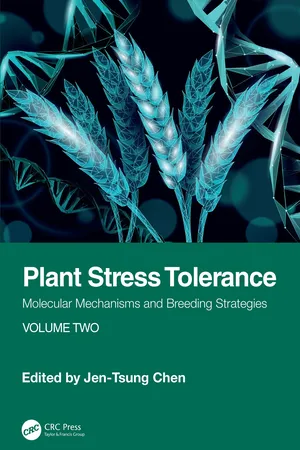
Plant Stress Tolerance
Molecular Mechanisms and Breeding Strategies, Volume Two
- 448 pages
- English
- ePUB (mobile friendly)
- Available on iOS & Android
About this book
Plant Stress Tolerance: Molecular Mechanisms and Breeding Strategies, Volume Two explores methods of precise management of biotic stressors including pests and pathogens. This is based on advanced molecular technologies including mutagenesis, genetic engineering, genome-wide association study, marker-assisted selection, genomic selection, molecular marker-based platforms, functional genomics, multiple omics tools, high-throughput technologies, computational biology, epigenetic manipulation, and clustered regularly interspaced short palindromic repeats (CRISPR)-based genome editing.
This book proposes strategies involving immunity-boosting through releasing genetic resources from naturally resistant plants, regulating defense systems by phytohormones, promoting disease tolerance by biostimulants, and nanotechnology such as nanocarriers for managing biotic stressors. These positive approaches help to advance and accelerate breeding programs for disease-tolerant crops against various pests and pathogens.
Plant Stress Tolerance: Molecular Mechanisms and Breeding Strategies, Volume Two is an ideal reference for the research fields of plant pathology, plant disease management, plant physiology, plant functional genomics, multiple omics, systems biology, and crop breeding. The book inspires ideas from the reader regarding future research on disease-resilient crops to face the challenge of global climate change and the increasing human population.
Frequently asked questions
- Essential is ideal for learners and professionals who enjoy exploring a wide range of subjects. Access the Essential Library with 800,000+ trusted titles and best-sellers across business, personal growth, and the humanities. Includes unlimited reading time and Standard Read Aloud voice.
- Complete: Perfect for advanced learners and researchers needing full, unrestricted access. Unlock 1.4M+ books across hundreds of subjects, including academic and specialized titles. The Complete Plan also includes advanced features like Premium Read Aloud and Research Assistant.
Please note we cannot support devices running on iOS 13 and Android 7 or earlier. Learn more about using the app.
Information
Table of contents
- Cover
- Half Title
- Title Page
- Copyright Page
- Table of Contents
- Preface
- Editor
- List of Contributors
- Chapter 1 Plant Cuticle Synthesis and Tolerance to Stress
- Chapter 2 Disease Resistance in Crops: Molecular Mechanisms and Breeding Strategies
- Chapter 3 Mutagenesis: A Promising Strategy for Elevating Plant Tolerance to Biotic Stress
- Chapter 4 Enhancing the Resilience of Apple to Fire Blight and Winter Injury in a Warming World
- Chapter 5 Recent Advancements in Genetic Engineering Techniques in Disease Resistance of Crops: An Outlook
- Chapter 6 Phytohormones: Crucial Factors for Plant Stress Tolerance
- Chapter 7 Integration of Multi-Omics Approaches and Speed Breeding for Plant Stress Tolerance: Challenges and Opportunities
- Chapter 8 Understanding Stress-Related Genes and the Role of Biostimulants in Biotic and Abiotic Stress Response to Improve Plant Breeding and Cultivation Methods
- Chapter 9 ABC Proteins as Regulators of Plant Tolerance to Biotic and Abiotic Stresses
- Chapter 10 Plant Genome Editing for Pest Management: Current Achievements and Future Directions
- Chapter 11 Plant Genome Editing for Viral Disease Management: Current Achievements and Future Directions
- Chapter 12 CRISPR Plants against Fungal Diseases: Methods and Applications
- Chapter 13 Plant Bacterial Disease Tolerance: Molecular Mechanisms and Breeding Strategies
- Chapter 14 Alternative Strategies to Control Bacterial Diseases in Plants
- Chapter 15 Beneficial Microbes for Phytonematode Control in Vegetable Crops
- Chapter 16 The Role of Microbial Consortia in Controlling Soil-Borne Pathogens
- Chapter 17 Molecular Mechanisms and Breeding Strategies for Insect Pest Resistance in Fruit Crops
- Chapter 18 Physiological and Molecular Mechanism of Insect Herbivory Tolerance in Plants: A Potential Tool for Resistance Breeding
- Index